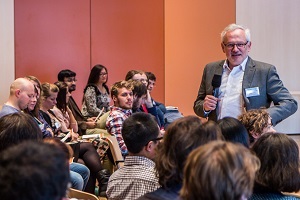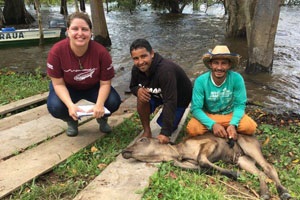Have we just witnessed an environmental policy paradox? We should all hope so.
In May, global fears were realised when President Trump gave notice that the USA was withdrawing from the 2015 Paris Agreement on Climate Change. Dr Akin Babatunde (Nigeria, 2009 Green Talent) said, ‘I was shocked by the USA’s position. But, it reminded scientists to not be aloof, to maintain and increase engagement with policymakers to ensure that convincing science cannot be politically side lined.”
The Paris Agreement aspires to moderate global warming to within 1.5˚C above pre-industrial temperatures. The Agreement’s driver is the very science which demonstrates that human activity creates long-term damage to humanity’s own ecosystem, from climate change to increased background radiation to micro-plastics polluting vital oceanic ecosystems.
So, why Trump’s announcement? He seemed to retain the view, that prioritising our environment constrained business’s ability to cater for immediate societal demands like improved healthcare and power-hungry funky consumer goods. His marginalisation of sustainability on economic grounds immediately prompted a widespread chorus of protest, demonstrating that the ‘green’ agenda was embedded in humanity’s joint global consciousness. Importantly, the other 147 signatory nations to the Paris Agreement re-stated their commitment (France and Germany very prominently) and there was also an angry global social media outburst which emphasized individuals’ commitment to sustainability.
Beyond that, businesses itself had already rejected the idea that sustainability was contrary to its interests. Indeed, in anticipation of the Trump announcement, 30 large-scale international businesses, from 3M to the Walt Disney Corporation, stated their commitment to the Paris Agreement, in an open letter to the President. Sustainability makes good business and research supports this.
Dr Steffen Bauer, a political scientist at the German Development Institute in Bonn (DIE), said, ‘The long-term political outcome of President Trump’s withdrawal is unclear but we now know that the Paris Agreement is highly visible to the public. Hopefully, the other UN sustainability framework, the 2030 Agenda, becomes equally as prominent. It covers global warming and other mutually supportive sustainability targets.’ The UN’s 2030 Agenda, signed by all 197 UN member nations in 2015, contains 169 individual targets grouped in 17 overarching Sustainable Development Goals (SDGs). The Green Talents 2017 call was themed on SDG 12, ‘Responsible Production and Consumption’.
The 2030 Agenda enshrines the UN’s definition of sustainability as ‘meeting the needs of the present without compromising the ability of future generations to meet their own needs.’ Dr Bauer added, that the DIE is analysing the synergies and tensions between the two UN policy frameworks and how they frame research efforts and policies (2030 Agenda and Paris Agreement).
Professor Georg Teutsch,  scientific lead at the Helmholtz Centre for Environmental Research (UFZ) in Leipzig, emphasizes the multidisciplinary approach required to meet the SDGs. ‘Environmental research is extremely complex today. Problems like global warming, food security and land degradation require integration of disciplines to provide options for decision makers. Germany has phenomenal infrastructure for ecosystem research. At UFZ, we teach our PhD students how to work in a multi-and trans-disciplinary environment. They are mentored by three diverse researchers to gain multiple perspectives whilst focussing on their PhD question.’
scientific lead at the Helmholtz Centre for Environmental Research (UFZ) in Leipzig, emphasizes the multidisciplinary approach required to meet the SDGs. ‘Environmental research is extremely complex today. Problems like global warming, food security and land degradation require integration of disciplines to provide options for decision makers. Germany has phenomenal infrastructure for ecosystem research. At UFZ, we teach our PhD students how to work in a multi-and trans-disciplinary environment. They are mentored by three diverse researchers to gain multiple perspectives whilst focussing on their PhD question.’
Green Talents Alumni reflect Professor Teutsch’s belief in cross-disciplinary approaches. Paula Araujo’s  (Brazil, 2015 Green Talent) work on food production and land management is an example. Interviewed over Facebook whilst working in the Amazon, she outlined that Green Talents funded her research stay at the University of Veterinary Medicine Foundation (TiHo) in Hannover. ‘I gained new perspectives on animal welfare, hygiene, behaviour and production. Now, I’m advising Amazonian farmers on land management and how brucellosis vaccination aids animal and human health in support of environmental protection.’ Paula’s multidisciplinary and cross institutional approach is repeated on the institutional scale related to SDG 12 funded by the German Research Association (DFG), which funds CRC 1026 “Sustainable Manufacturing – Shaping Global Value Creation”. It is a collaboration between the Fraunhofer Institute, Technical University of Berlin (TUB), Berlin Social Science Centre (WZB, a Leibniz Centre) and the Zuse Institute Berlin (ZIB). It aims to demonstrate that sustainable manufacturing is superior to traditional modes of business, not just good business but the best business.
(Brazil, 2015 Green Talent) work on food production and land management is an example. Interviewed over Facebook whilst working in the Amazon, she outlined that Green Talents funded her research stay at the University of Veterinary Medicine Foundation (TiHo) in Hannover. ‘I gained new perspectives on animal welfare, hygiene, behaviour and production. Now, I’m advising Amazonian farmers on land management and how brucellosis vaccination aids animal and human health in support of environmental protection.’ Paula’s multidisciplinary and cross institutional approach is repeated on the institutional scale related to SDG 12 funded by the German Research Association (DFG), which funds CRC 1026 “Sustainable Manufacturing – Shaping Global Value Creation”. It is a collaboration between the Fraunhofer Institute, Technical University of Berlin (TUB), Berlin Social Science Centre (WZB, a Leibniz Centre) and the Zuse Institute Berlin (ZIB). It aims to demonstrate that sustainable manufacturing is superior to traditional modes of business, not just good business but the best business.
It is unlikely that Professor Teutsch, Dr Babatunde, Paula Araujo and President Trump have a shared vision for the future of the Earth but they all remind us that dedicated environmental researchers are essential to humanity’s future and that analysis of highly complex societal forces is required to help avoid self-destructive, including in business-terms, political framing.
In time, analysis of Trump’s dramatic step away from a commitment to sustainability might, quite paradoxically, show that he has propelled the sustainability agenda forwards. But, there is no cause for complacency from researchers, research funders and those who communicate the benefits of that research to policymakers and business leaders.






